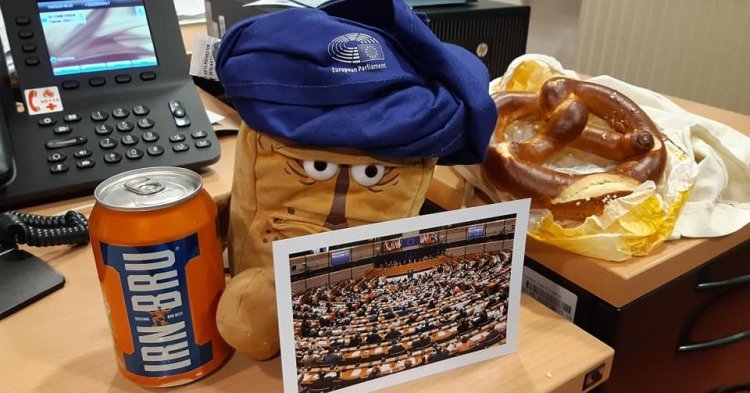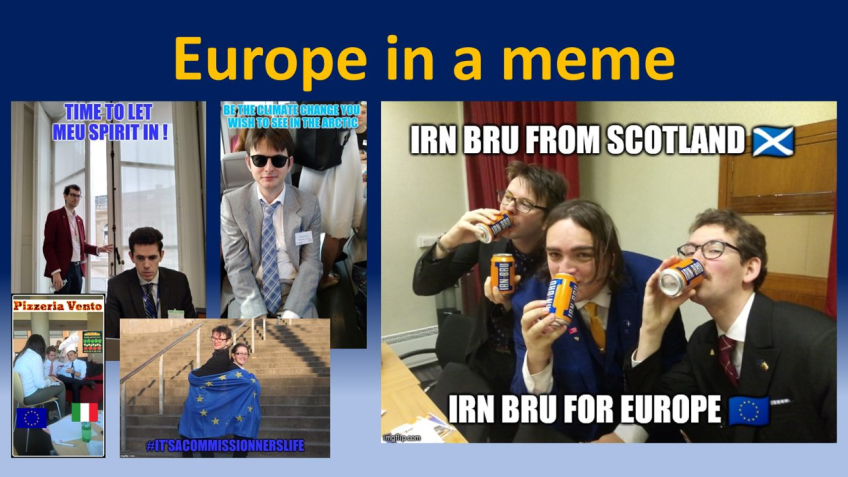When you report on the European Union, you often work with memes on Facebook and other platforms. What made you think of this?
It all started with simulations, for example, the Model European Union (MEU), which I helped organise several times in the past. There, I spontaneously started to post pictures of the debates with comments, which were very well received. Because of the positive feedback, I started to make memes regularly.
What special value can memes bring to coverage of European politics?
Memes work so well because they bring irony and humour to what is often perceived as boring and bureaucratic EU politics. They can attract a lot of attention, especially among young people, because they can help to convey short and concise messages across social media. They are also a wonderful way of addressing the weaknesses of today’s EU with a self-deprecating view and encouraging its development.
You have recently incorporated two elements into your memes that keep coming back: a piece of bread that travels through Europe and the ominous drink Irn Bru. Can you explain what that is all about?
The idea for Bernd the Bread originally came when, as a chaperone, I was faced with the problem that travellers were constantly forgetting departure times and coming back late to the bus. I simply said that we would leave when the bread was on board - and all of a sudden it worked very well. This gave me the idea to send Bernd the Bread as a mascot on a journey across Europe, which also offered something for identification. We discovered Irn Bru during a MEU in Glasgow and it quickly became a meme. But we are still waiting for a sponsorship contract. It’s simply a matter of offering common objects for identification and these recurring elements enable a kind of “storytelling”. During simulations, it especially helps the less experienced participants to have a common running gag.
What do you think of the fact that social media has become more of a focus for political communication? Can the gap between politicians and citizens be bridged? Or should we pay particular attention to the danger of populists using social media for their own ends?
A positive development is the great dynamic and the new opportunities for interactions with the public. On the other hand, this dynamic is often so fast, that information can no longer be properly processed and reflected upon. This results in a greater danger of populism and the spread of fake news. In the past, memes have played a role in Brexit and the Trump election that should not be underestimated, although they have sometimes been used to spread fake news. Memes are powerful.
What can the EU do about misinformation in the media?
It would be important to react more quickly on false reports and to reject them firmly. That is why Brexit was also a wake-up call for a better communication strategy for the European Union. So far, there is still a lack of didactically well-prepared materials. Also, a “European Centre for Civic Education” is needed, where information about the EU is provided. Ultimately, the aim must be to strengthen people’s ability to handle social media.
Perhaps the best-known German MEPs and meme producers are currently Nico Semsrott and Martin Sonneborn. Do you see them as an asset to the European Parliament?
Many of my colleagues here in Brussels are annoyed by them and see them as “paid jesters” of the EU. But in my eyes, they are definitely an asset, because even in the Middle Ages court jesters had the task of unscrupulously criticising their kings under the protection of jester’s privilege. The EU also needs this kind of critical examination. I am thinking, for example, of the way in which von der Leyen became President of the Commission after the European elections. Here, Europe is failing to live up to some of its own expectations. However, I think it is a pity when groups of visitors come who, as European politicians, only know Martin Sonneborn or Nico Semsrott. Because, although they are humorous and critical, they have no claim to help shape the EU themselves. With their satirical approach, however, they have filled a gap in the EU media landscape, because unfortunately there is still no European satirical programme like there is for German politics (i.e. Heute-Show, extra 3, or Die Anstalt). Europe should be able to laugh together about itself more.
In addition to your hobby as a “Meme Commissioner”, you are currently a trainee in the Visits Service of the European Parliament. What exactly do you do there?
My main task is to organise and supervise visits here in the European Parliament for different groups. Although that is a challenge because you have to adapt again and again, as the groups have such different levels of background knowledge and motivation, it is also incredibly exciting. Every group is unique. And there are sometimes very funny encounters. Once we had a teacher who had instructed his students beforehand to pay attention but then fell asleep himself during the lecture. Another time, a member of parliament, who was actually supposed to represent Manfred Webster in another session, got lost and then spontaneously took time for questions. And once during another visit, the electricity went out and I had to work on the fly with pen and paper. Such experiences and the direct feedback from the visitors are very motivating and I am glad to work so closely with the public. As the Visits Service, we are the shop window of the European Parliament, so to speak.
What have you personally learned about the EU during your traineeship so far?
I was very surprised by the unintimidated, uncomplicated manner in which people treat each other, even across party lines. Most of them are very open and approachable. However, I have also noticed that a lot of things here in Brussels take place in a kind of “EU bubble”. Sometimes there is a lack of contact with the general public and especially with the people of Brussels.
Do you have any tips for the young people interested in European politics and maybe even in an internship in the EU institutions?
I would encourage everyone to give it a try. Often, there is a misconception that EU institutions are only staffed by people from elite universities with absolutely outstanding CVs. I haven’t experienced it that way. On the contrary, actually, there is a great variety of backgrounds among the trainees and I, too, studied in Bamberg quite normally. But it is important to show passion and commitment to the European idea. I can only advise everyone to have the courage to apply for internships or jobs outside of their own country. On my website, you will find some helpful links for various ways to get to know Europe and to get involved in European politics. Again and again, I tell my visiting groups: be curious, be critical, enjoy the opportunities offered by the EU and develop them further.



1. On 27 February 2020 at 23:24, by Royd Replying to: Meet the “Meme Commissioner”
Replying to: Meet the “Meme Commissioner”
CRINGE bold italic -*list text
Follow the comments: |
|
